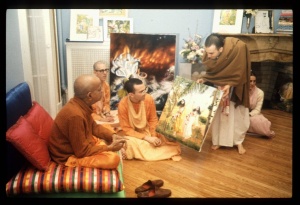SB 1.4.28-29: Difference between revisions
m (1 revision(s)) |
No edit summary |
||
| Line 1: | Line 1: | ||
{{info | {{info | ||
|speaker= | |speaker=Śrīla Vyāsadeva | ||
|listener= | |listener=Thinking to himself | ||
}} | }} | ||
[[Category:Srimad-Bhagavatam - Canto 01 Chapter 04]] | |||
[[Category:Bhagavatam Verses Spoken by Vyasadeva - Vanisource|010428]] | |||
<div style="float:left">'''[[Srimad-Bhagavatam]] - [[SB 1|First Canto]] - [[SB 1.4: The Appearance of Sri Narada|Chapter 4: The Appearance of Śrī Nārada]]'''</div> | |||
<div style="float:right">[[File:Go-previous.png|link=SB 1.4.27]] '''[[SB 1.4.27]] - [[SB 1.4.30]]''' [[File:Go-next.png|link=SB 1.4.30]]</div> | |||
{{CompareVersions|SB|1.4.28-29|SB 1962|SB 1972-77}} | |||
{{RandomImage}} | |||
==== TEXTS 28-29 ==== | ==== TEXTS 28-29 ==== | ||
<div | <div class="verse"> | ||
dhṛta-vratena hi mayā | :dhṛta-vratena hi mayā | ||
chandāṁsi guravo 'gnayaḥ | :chandāṁsi guravo 'gnayaḥ | ||
mānitā nirvyalīkena | :mānitā nirvyalīkena | ||
gṛhītaṁ cānuśāsanam | :gṛhītaṁ cānuśāsanam | ||
bhārata-vyapadeśena | |||
hy āmnāyārthaś ca pradarśitaḥ | :bhārata-vyapadeśena | ||
dṛśyate yatra dharmādi | :hy āmnāyārthaś ca pradarśitaḥ | ||
strī-śūdrādibhir apy uta | :dṛśyate yatra dharmādi | ||
:strī-śūdrādibhir apy uta | |||
</div> | </div> | ||
| Line 21: | Line 28: | ||
==== SYNONYMS ==== | ==== SYNONYMS ==== | ||
<div | <div class="synonyms"> | ||
dhṛta- | ''dhṛta-vratena''—under a strict disciplinary vow; ''hi''—certainly; ''mayā''—by me; ''chandāṁsi''—the Vedic hymns; ''guravaḥ''—the spiritual masters; ''agnayaḥ''—the sacrificial fire; ''mānitāḥ''—properly worshiped; ''nirvyalīkena''—without pretense; ''gṛhītam ca''—also accepted; ''anuśāsanam''—traditional discipline; ''bhārata''—the ''Mahābhārata''; ''vyapadeśena''—by compilation of; ''hi''—certainly; ''āmnāya-arthaḥ''—import of disciplic succession; ''ca''—and; ''pradarśitaḥ''—properly explained; ''dṛśyate''—by what is necessary; ''yatra''—where; ''dharma-ādiḥ''—the path of religion; ''strī-śūdra-ādibhiḥ api''—even by women, ''śūdras'', etc.; ''uta''—spoken. | ||
</div> | </div> | ||
| Line 28: | Line 35: | ||
==== TRANSLATION ==== | ==== TRANSLATION ==== | ||
<div | <div class="translation"> | ||
I have, under strict disciplinary vows, unpretentiously worshiped the Vedas, the spiritual master and the altar of sacrifice. I have also abided by the rulings and have shown the import of disciplic succession through the explanation of the Mahābhārata, by which even women, śūdras and others [friends of the twice-born] can see the path of religion. | I have, under strict disciplinary vows, unpretentiously worshiped the Vedas, the spiritual master and the altar of sacrifice. I have also abided by the rulings and have shown the import of disciplic succession through the explanation of the Mahābhārata, by which even women, śūdras and others [friends of the twice-born] can see the path of religion. | ||
</div> | </div> | ||
| Line 35: | Line 42: | ||
==== PURPORT ==== | ==== PURPORT ==== | ||
<div | <div class="purport"> | ||
No one can understand the import of the Vedas without having undergone a strict disciplinary vow and disciplic succession. The Vedas, spiritual masters and sacrificial fire must be worshiped by the desiring candidate. All these intricacies of Vedic knowledge are systematically presented in the Mahābhārata for the understanding of the woman class, the laborer class and the unqualified members of brāhmaṇa, kṣatriya or vaiśya families. In this age, the Mahābhārata is more essential than the original Vedas. | No one can understand the import of the ''Vedas'' without having undergone a strict disciplinary vow and disciplic succession. The ''Vedas'', spiritual masters and sacrificial fire must be worshiped by the desiring candidate. All these intricacies of Vedic knowledge are systematically presented in the ''Mahābhārata'' for the understanding of the woman class, the laborer class and the unqualified members of ''brāhmaṇa, kṣatriya'' or ''vaiśya'' families. In this age, the ''Mahābhārata'' is more essential than the original ''Vedas''. | ||
</div> | </div> | ||
__NOTOC__ | |||
<div style="float:right; clear:both;">[[File:Go-previous.png|link=SB 1.4.27]] '''[[SB 1.4.27]] - [[SB 1.4.30]]''' [[File:Go-next.png|link=SB 1.4.30]]</div> | |||
__NOTOC__ | |||
__NOEDITSECTION__ | |||
Revision as of 03:36, 30 April 2021

A.C. Bhaktivedanta Swami Prabhupada
TEXTS 28-29
- dhṛta-vratena hi mayā
- chandāṁsi guravo 'gnayaḥ
- mānitā nirvyalīkena
- gṛhītaṁ cānuśāsanam
- bhārata-vyapadeśena
- hy āmnāyārthaś ca pradarśitaḥ
- dṛśyate yatra dharmādi
- strī-śūdrādibhir apy uta
SYNONYMS
dhṛta-vratena—under a strict disciplinary vow; hi—certainly; mayā—by me; chandāṁsi—the Vedic hymns; guravaḥ—the spiritual masters; agnayaḥ—the sacrificial fire; mānitāḥ—properly worshiped; nirvyalīkena—without pretense; gṛhītam ca—also accepted; anuśāsanam—traditional discipline; bhārata—the Mahābhārata; vyapadeśena—by compilation of; hi—certainly; āmnāya-arthaḥ—import of disciplic succession; ca—and; pradarśitaḥ—properly explained; dṛśyate—by what is necessary; yatra—where; dharma-ādiḥ—the path of religion; strī-śūdra-ādibhiḥ api—even by women, śūdras, etc.; uta—spoken.
TRANSLATION
I have, under strict disciplinary vows, unpretentiously worshiped the Vedas, the spiritual master and the altar of sacrifice. I have also abided by the rulings and have shown the import of disciplic succession through the explanation of the Mahābhārata, by which even women, śūdras and others [friends of the twice-born] can see the path of religion.
PURPORT
No one can understand the import of the Vedas without having undergone a strict disciplinary vow and disciplic succession. The Vedas, spiritual masters and sacrificial fire must be worshiped by the desiring candidate. All these intricacies of Vedic knowledge are systematically presented in the Mahābhārata for the understanding of the woman class, the laborer class and the unqualified members of brāhmaṇa, kṣatriya or vaiśya families. In this age, the Mahābhārata is more essential than the original Vedas.